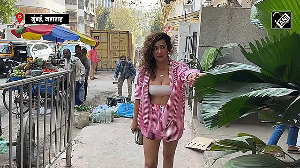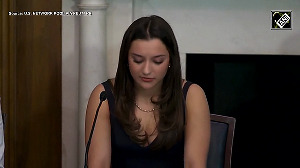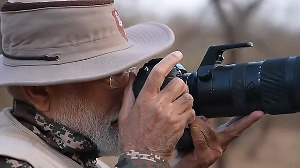The perception about JNU being 'radical' is one that is as old as JNU itself.
But the university is more than just that.
At its heart, its campus is a mosaic of ideologies that allow its students to breathe politically, says Manavi Kapur.

After I pull up my car near an autorickshaw to ask the driver directions to my destination, he obliges but tells me to be careful: "Inn JNU waalon se sambhal ke rehna (Be careful of these JNU people)"
I am still amused as I walk around and breathe in the fresh, misty air inside the sprawling Jawaharlal Nehru University, or JNU, campus in New Delhi.
The university is in the eye of a recent storm over alleged 'anti-national' activities and the arrest of one of its student leaders, Kanhaiya Kumar.
What began as a 'cultural event' on February 9 to mark the hanging of Afzal Guru, a convict in the 2001 attack on Parliament, soon became a bone of contention between the Left and Right parties on the campus -- with the Bharatiya Janata Party's student wing, the Akhil Bharatiya Vidyarthi Parishad, on one side, and the various Left-leaning student organisations, such as the Student Federation of India, All India Student Federation and Democratic Students Union, on the other.
As the protests got louder, so did the demands to shut the campus down.
On social media platforms such as Twitter, #ShutDownJNU was one of the top trends.
Chandan Mitra, BJP member of the Rajya Sabha, in a blog post on NDTV's Web site, suggested the campus rather be used as a training academy for civil servants.
In another blog post, titled Dear JNU Students, We Fund Your Studies, Not Your Politics, T V Mohandas Pai, chairman of the Manipal Global Education and former Infosys board member, condemned the 'outdated' Left ideologies that have brought down the level of research at JNU.
'In case students wish to focus on politics and not on their studies, there is no case for taxpayers to subsidise extreme views or an archaic Left,' he wrote.
Inside the office of Rakesh Batabyal, associate professor at the Centre for Media Studies in the JNU, a young woman, who is here to meet Batabyal for advice on what course she should apply for, voices similar views.
"These students have too much time on their hands. If their parents had sent them to a private university where they had to pay a lot more money, they would keep their heads down and just study," she says. Education at JNU is, of course, highly subsidised.
Once the 25 year old leaves, Batabyal, a historian who wrote JNU: The Making of A University, turns to me with a befuddled expression.
"Is this what we have created? Are students merely meant to take examinations? The university is meant to be a space to question, not blindlessly conform," he says.
Alamu Rathinasabapathy, a political science alum of the university, recalls the stereotypes about JNU that she heard before she joined the campus.
"I had constantly heard from people that 'It is a den of Communists', 'We don't want our children to study in JNU because it propagates left ideology', 'It is the democratic republic of China', 'You people support Naxals'. All that changed when I began studying there," she says.
Another alum from the School of Languages, Literature and Culture Studies, Bedatri Datta Choudhury, recalls more such cliches.
"There seems to be a presumption that coming from JNU, I would probably be someone who engages in a lot of debates. They assume I am a Leftist too, like they always assume I am a feminist when I tell them I went to the Lady Shri Ram College for Women. I quite enjoy having these perceptions about myself and do not take them to be a stigma," she says.
The perception about JNU being 'radical', the jhollawalas not doing much other than organising protest marches, is one that is as old as JNU itself.
Established in 1969, the JNU campus soon became a Left bastion, especially since a lot of its early faculty members came from Presidency College in Kolkata.
But even within the Left, the JNU remained largely affiliated to the ideologies of the Communist Party of India, which was, in turn, closely aligned to the political and social vision of the Congress and its leader, Indira Gandhi.
The 'radicalisation' within the JNU happened soon after the split within the Communist Party, with the CPI-Marxist and the CPI-Marxist-Leninist emerging as more Left than the CPI. This was also a time when Russia was India's great policy and ideology influencer, and a Sino-Soviet split in Communist ideologies was simultaneously acting itself out on the global stage.
For India in general and JNU in particular, the CPI and Congress aligned with Russia and the CPI-M and CPI-ML looked towards China for a more revolutionary vision of Communism.
Soon after its establishment, India witnessed the Emergency under Indira Gandhi's rule and the rise of the Total Revolution spearheaded by Jayaprakash Narayan.
A woman who grew up on campus in the 1970s recalls JNU as a "seething cauldron of white hot passion."
"One of my most vivid memories is from a general body meeting of the JNU Students Union one night. People from within the so-called Left were attacking each other's ideas and they brooked no curbs," she says.
It is this history that shapes JNU's politics today, but over a period of time, has also created space for differing political ideologies to co-exist.
Even in the late 1980s, when India was on the brink of liberalising its economy, it was politics that played out in debates and not 'militant' expression of thought.
"I was not in favour of a lot of stuff being taken up as issues, but no one forced me. I enjoyed the debates and discussion, even if I did not agree with the views being expressed," recalls a senior journalist.
In his two years at JNU, he says there were a large number of Centrists, "free-thinkers", Leftists and even "radical" Leftists who supported Maoism.
"Self-determination, class and hegemony were commonly taken recourse to discuss issues," he says.
But classrooms in the JNU are not devoid of Right-leaning view points either.
"For the Indian political philosophy course, I read writing by (the Rashtriya Swayamsevak Sangh's second Sarsanghchalak) M S Golwalkar and (the author of Hindutva) V D Savarkar. In fact, I read very little Marx and Engels," says Rathinasabapathy.
She also points towards the last election for the students' body in JNU, where the joint secretary's post in the central panel was contested and won by an ABVP candidate.
"Another interesting trend emerged this year, when a majority of the students voted for extreme Right and Left-wing candidates in the same chit," she explains.
JNUSU has four seats -- president, vice-president, secretary and joint secretary -- and students vote in a single chit for all four posts.
"We were quite baffled as you could still vote on individual basis within the Right/Left wing of the spectrum, but what does voting for ABVP and AISA in the same chit convey?"
As I have countless times before, I lose my way inside the JNU campus, and like all those times, a student graciously offers to walk me back to the main street.
V S Gourish, a student of the arts and aesthetics department, says he is familiar with Left politics since he belongs to Kerala.
"But I feel no affinity to the Left cause after I joined JNU. With so many student organisations, it can get quite confusing," he says.
While most students on campus are politically engaged, not everyone is politically active.
"I think the intellectual Left is different from the political Left. For instance, except for one or two professors, there are hardly any self-proclaimed Marxists in my department," explains Rathinasabapathy. "Besides, the intellectual Left does not necessarily support the position of the political Left."
Not only are there differences within the Left, there are several professors within the JNU who do not associate themselves with the Left school of thought.
Rama Baru, a professor in the Centre of Social Medicine and Community Health, explains how even during the general body meeting to discuss Kumar's arrest, several teachers came out to openly condemn the 'anti-national' activities.
"Our university celebrates ideological pluralism. Without plurality of thought, a university is just a teaching shop," she says.
In fact, the GBM, according to Baru, specifically instructed teachers and students to not alienate any student of the ABVP or their supporters in the faculty.
"The university is a space for dialogue and no one benefits from discrediting JNU," she explains.
It seems some ABVP students saw merit in this sentiment and resigned from their posts to protest the malicious statements that were being publicly expressed against JNU.
Pradeep Narwal, joint secretary of the ABVP JNU unit, wrote in a Facebook post: 'Today we all must stand together to save JNU which has given us identity, we need to come across party lines to save reputation of this institution, to save future of JNUites as more than 80 per cent students don't belong to any political party.'
Outside Batabyal's office in the Social Sciences Department, Che Guevara's face looks over the foliage.
On the opposite wall, the map of India, with what appears to be Bharat Mata at the centre, is painted in vibrant colours.
There are countless ABVP posters, and almost as many from SFI, in a silent battle for wall space.
Batabyal calls Left-leaning parties a peculiar condition of Communism in India.
And across solidarity marches and open lectures, it is this peculiarity that shines through.











 © 2025
© 2025